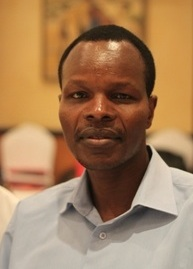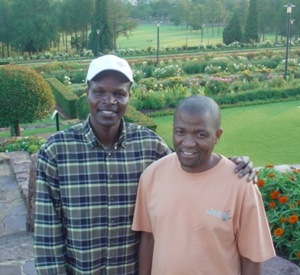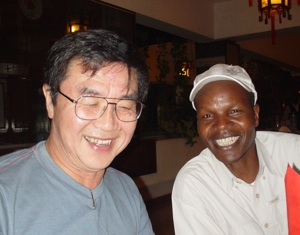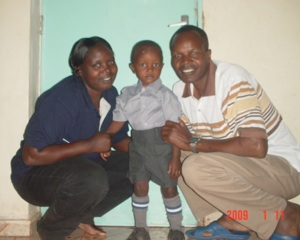 John Akoten, Kenya
John Akoten, Kenya
Deputy Director for Research, Awareness & Preventive Services, Anti-Counterfeit Agency, Ministry of Industrialization
International Development Studies Program MA & Ph.D. (’05)
Dr. John Akoten is a Deputy Director for Research, Awareness & Preventive Services at the Anti-Counterfeit Agency, a parastatal body within the Kenyan Ministry of Industrialization. In his current role he assists in the implementation of the vision and mission, and prepares strategic plans of the Agency. He also undertakes research on counterfeit issues and is responsible for training and education of judges, magistrates, inspectors, prosecutors, and custom officials on enforcement of intellectual property rights; organize and conduct regular workshops on counterfeit products.
Until April ’10, Dr. Akoten was Ag. Executive Director of the Institute of Policy Analysis and Research (IPAR), an independent, non-profit organization established in 1994 that aims to strengthen the national capacity to develop, implement, and evaluate public policy in Kenya. The Institute conducts policy analysis and research and shares the result with the government of Kenya, development partners, the private sector, and civil society.
John Akoten holds a BSc. (Hons) in Horticulture from Jomo Kenyatta University of Agriculture and Technology. Upon the successful completion of the master’s program in International Development Studies (IDS) at GRIPS in 2001, John proceeded to the Ph.D. program and received his Doctoral degree in International Development Studies in 2005.
Dr. Akoten’s policy research focus has been on enhancing access to credit for micro and small enterprises; micro-finance institutions and their impact on MSE financing; determinants of small firm productivity and growth in Kenya; transformation of industrial clusters especially in the Jua Kali industry; role and impact of export processing zones; and Kenya’s competitive advantage. He has been collaborating with GRIPS and FASID on a number of projects.
What is your area of specialization and how did you come to work in this area?
My area of specialization is industrial development with specific focus on industrial clustering. I came to work in this area because of two reasons: First, I was introduced to the field of industrial development when I got employed by the Department of Industry in the then Ministry of Commerce and Industry as an industrial development officer. At that time, I had just graduated from university with a bachelor’s degree in horticulture. Second, when I joined GRIPS for a master’s degree program, Prof. Otsuka ushered me into the field of industrial clustering, which I found to be very interesting. Since then, I have researched on the role of industrial clustering in industrial development.
You spent most of the past five years working at the Institute of Policy Analysis and Research (IPAR) in Nairobi. Please tell us a bit about IPAR and your role in there.
IPAR is a private, non-profit research organization that was established in 1994. Its mandate is to provide objective, data-based policy analysis and research as well as capacity building to the government, civil society organizations and development partners. IPAR has four programs: governance and development, macroeconomics, real sector (agriculture, industry), and social sector (health and education). In addition, it has an internship and attachment program where final-year master’s students write their thesis or research papers under the supervision of senior researchers. IPAR’s vision is to become a centre of excellence in policy analysis and research.
I joined IPAR in November 2005 as a Research Fellow and Coordinator of the Real Sector Program. My tasks involved conducting research and making local and international presentations on agriculture and industrial policy issues, including supervising master’s students, junior research staff and government officials interested in policy research. On numerous occasions, I also served as Acting Executive Director until when I was officially confirmed in October 2009. I took up this position until April 2010 when I resigned because of bad governance.
 What are your career objectives and how have your various experiences help you meet these goals.
What are your career objectives and how have your various experiences help you meet these goals.
I am striving to be an authoritative expert on industrial development issues in Africa, particularly on the role of industrial clusters on development. I am glad to note that my past and current work and experiences drawn from Japan and other East Asian Economies have helped to sharpen my mind to concentrate on addressing constraints to industrial development with particular focus on industrial clusters.
You recently moved to a new position. How does it fit in with your career objectives?
Currently, I am working with the Anti-Counterfeit Agency, a parastatal in the Ministry of Industrialization as a Deputy Director of Research and Awareness. The Agency seeks to be a global leader in combating counterfeits and piracy in Kenya. Counterfeiting is an infringement of intellectual property rights. In this sense, it discourages innovation, investment, industrial performance and retards economic growth in general. By combating counterfeiting, the role of industrial clusters in industrial development is likely to be strengthened.
What has been the most rewarding aspect of your career thus far and what achievement(s) are you most proud of?
At the national level, I have been able to contribute towards Kenya’s adoption of the industrial cluster concept in its quest for industrial development. At the local level, I managed to secure donor support for the Institute of Policy Analysis and Research, despite the challenges it has had in the past with key donors. I successfully collaborated with and received funding from FASID/GRIPS, IDE-JETRO, JICA, the World Bank, and the International Development Research Centre (IDRC) of Canada.
What do you see as the main opportunities and challenges for Kenya over the course of the next five to ten years?
Kenya yearns to join the league of newly industrializing economies by the year 2030, as stipulated in the Vision 2030. The country is also a member of the East African Community which consists of five countries: Kenya, Uganda, Tanzania, Rwanda and Burundi. With increased market in the region, Kenya is poised to have more opportunities to increase the market share of her products, expand her industries, create employment, and reduce poverty. The common market will also see the movement of labour and capital among the member countries. However, Kenya is likely to face some challenges in the next five to ten years. With the removal of economic borders, Kenya will compete for FDI with member countries, may suffer from the influx of people from other countries in search of jobs and other opportunities. This is likely to worsen insecurity and conflict over resources, while creating challenges with regard to the amendment of various Kenyan laws to accommodate the common market protocol. Other challenges include high cost of electricity, inadequate water supply for industrial and domestic use, and environmental degradation. In addition, Kenya has just adopted a new constitution that was decided upon through a constitutional referendum held on August 4, 2010. The new constitution has a strong bearing on the implementation of Vision 2030.
One other challenge that Kenya faces with the opening of the borders is fighting counterfeits. Currently, Kenya is the only country south of Sahara and north of Limpopo with an anti-counterfeit agency. Therefore, it would be a challenge to effectively police counterfeit products coming into Kenya from various borders with her neighbours, who are yet to formulate and enact relevant legislation on intellectual property rights. Although there is a draft policy and legislation on the East African Anti-Counterfeit Bill, the bill is not anchored on individual country’s legislation on intellectual property rights, which are non-existent.
 You stayed in Japan for about five years and obtained both your Masters and Ph.D. in International Development Studies from GRIPS. How has your time and studies in Japan influenced you in your subsequent life and career?
You stayed in Japan for about five years and obtained both your Masters and Ph.D. in International Development Studies from GRIPS. How has your time and studies in Japan influenced you in your subsequent life and career?
I consider myself very lucky to have studied in Japan, both at the Masters and PhD levels. The program was tough considering that I was doing economics for the first time. I had to compete with students of economics in their first or second degree. This made me to work hard and remain focused. I learnt this important and positive trait from the Japanese who work 7-11 that it is possible for one to achieve what they want in life so long as you remain focused. In Japanese, there is nothing like failure. Everyone believes in success. Moreover, in Japan, there is high sense of moral probity and people take responsibility for their actions without being pushed or cajoled. This creates room for soul-searching and personal corrective behaviour. This trait of culture of shame is missing in Kenya!
If you could choose another profession to be in, what would it be?
I would choose development economics. I did not know that economics is part and parcel of our lives.
What is your fondest memory of your time spent in Japan?
My fondest memory while in Japan is when I climbed Fuji-san to the top, skied at Karuizawa and had to be helped by my Japanese colleagues when I skidded dangerously to the side of the cliff!
What do you miss about Japan?
I miss many things in Japan, ranging from her kind and friendly people to its advanced technology and friendly environment. I miss the convenient shop 7-11, which reminds me of the hard work by the Japanese. I miss skiing especially at the Karuizawa resort. I miss sushi and tempura. I miss Yoshinoya and my two-gear bicycle which I left behind unfortunately!

What is your favourite thing to do when you are not working?
When not working, I love walking, swimming, making friends, playing keyboard and discovering things such as new items on the shop shelves, unfamiliar streets in a city, etc. For instance, I visited London for the first time on my way to Oxford, bought a ticket for the evening bus and decided to walk along streets for a couple of hours to enjoy the beauty of the city. Unfortunately, I got lost on my way back to catch the bus for Oxford. Panting heavily, I had a few minutes before the bus could leave and I quickly saw a subway which I used. I got out on a wrong exit but was able to find my way out to the right exit where I left my luggage and caught the bus when it was just about to leave! In short, I am adventurous!
How do you maintain a balance between your work and the rest of your life?
Even though I get too busy with work, I usually set a side time to help my children with their homework, assist my wife (who is working and attending classes for a higher national diploma course) with her studies, visit a national park or recreational places, and visit friends and relatives.
What advice would you give to current GRIPS students?
I advice them that opportunities knock once. Therefore, they should make use of the time they have at GRIPS to excel in their academic work, learn as much as possible from the skilled and experienced GRIPS/FASID professors, and interact with fellow students. They should identify and focus on development issues which will benefit their country upon their return. Also, they should discover Japan by taking time off to visit various places.





